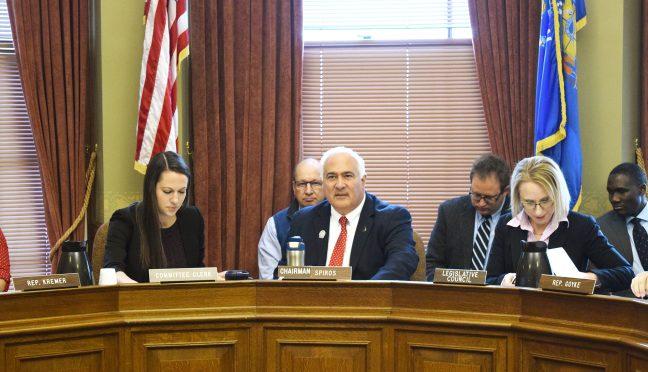The Committee on Criminal Justice and Public Safety met Thursday to discuss three bills and ultimately passed a bill criminalizing texting while driving.
Bills dealing with firearm possession and purchasing, online impersonation of other people and changes to the responsibilities of the Law Enforcement Standards Board were discussed in committee public hearing.
Rep. Joe Sanfelippo, R-New Berlin, introduced a bill that would make it a crime to purchase a firearm with the intent of giving it to a person who cannot legally possess one, a process often referred to as “straw purchasing.”
Currently, gun dealers require people to pass a background check before receiving a gun. Under the bill, providing false information on a background check, such as intent to provide a firearm to a person who cannot legally possess one, would be a Class H felony and would be fined between $500 and $10,000 and imprisoned for up to nine months.
Sanfelippo referenced rising crime rates, specifically gun violence crimes, as the main reason why he drafted the bill.
“People who should not be allowed to possess a gun, and would not be allowed to possess a gun if they had felonies on their records, could have a long line of misdemeanors crimes they’ve been charged with … yet the felon cannot have a gun but the person charged with the misdemeanors [can],” Sanfelippo said.
Rep. Frederick Kessler, D-Milwaukee, took issue with the bill arguing concealed carry laws would also reduce the amount of guns ending up in criminal possession. But Rep. John Spiros, R-Marshfield, Chairman of the Committee, said the committee was not scheduled to discuss concealed carry law and proceeded with the hearing.
Rep. Bob Kulp, R-Stratford, introduced a bill involving online impersonations last month, citing outdated impersonation laws. He said the laws had not been updated in over 20 years, and his legislation provided necessary changes for a world with developing technology.
Kulp said this law helps protect vulnerable people from “catfishing,” an online term for the act of deceiving someone online using a false identity, and other online scammers.
“If a reasonable person thinks that there is satire or parody going on, we certainly don’t want to clamp down on that,” Kulp said. “But if people are using a platform of impersonations to defraud … that’s when we want to say ‘No,’ that can’t happen in Wisconsin’.”
Some committee members took issues with specific language that was not clear in the bill.
Rep. Cody Horlacher, R- Mukwonago, worried the bill could make it illegal for employees to represent their bosses in company affairs through emails or social media profiles. But Kulp said the bill specifies instances of harmful intent when representing others, which would allow for those employee provisions.
Kulp raised bi-partisan support for the bill in the Assembly and said he felt confident it would pass in committee.
The committee ended with an executive session to vote on a bill which would make checking interactive electronic devices while driving punishable by law. Under the bill, there are varying levels of fines for violators of the proposed law, along with a Class G felony fine up to $25,000, imprisonment up to 10 years, or both.
The bill passed (6-3) in the executive committee hearing.














